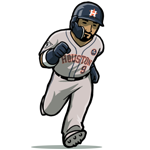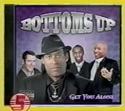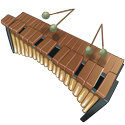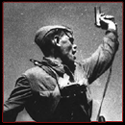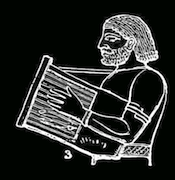|
Cast_No_Shadow posted:Not an area of expertise for my self but the extend of my knowledge is basically, if you are playing to yourself\in your bed room etc just buy any half decent monitors and be happy. Yeah an amp is probably overkill if you're just starting out. Just buy some 1/4" cables and plug those left and right outputs into your front two inputs on the Focusrite, hook up some decent studio monitors to the Focusrite as well, route everything through your computer, and you're all set for quite a long runway of home use/learning.
|
|
|
|

|
| # ? May 22, 2024 06:23 |
|
Ok, thanks. I read the Electro's manual, but it didn't say anything about these things. Decent studio monitors, you say. Might be just as basic as my former questions, but I have no idea what's decent. A little googling gave me these: http://www.sweetwater.com/store/detail/HS50M Decent enough?
|
|
|
|
Yes, well-reviewed Yamaha monitors that cost $200 each will probably be decent enough :P You might want a sub too. You could spend almost $400 on the Yamaha one http://www.amazon.com/Yamaha-HS10W-Powered-Studio-Monitor/dp/B000Z7C9HK/ref=pd_sim_MI_2 or get something like the $80 Polk Audio PSW-10(I have this, I like it) http://www.amazon.com/Polk-Audio-10...ywords=polk+sub If you want to go cheaper on monitors look at M-Audio http://www.amazon.com/M-Audio-Studi...eywords=m-audio or KRK http://www.amazon.com/KRK-RP5G2-Pow...words=krk+rokit
|
|
|
|
Are the M-Audio monitors half-decent? I'd hate to cheap out on monitors but I basically have to cheap out on something at this point
|
|
|
|
ashgromnies posted:Yes, well-reviewed Yamaha monitors that cost $200 each will probably be decent enough :P Xabi fucked around with this message at 09:07 on Jan 16, 2013 |
|
|
|
If you're gunna cheap out on anything, cheap out on the monitors. Mainly because $80 is nothing in the scheme of things for this instrument, its an expensive beast at times. And when you do want to upgrade, its the smallest sunk cost (and heck, monitors are always useful) and its by far the easiest to bit to upgrade (except maybe the stool).
|
|
|
|
stuart scott irl posted:Are the M-Audio monitors half-decent? I'd hate to cheap out on monitors but I basically have to cheap out on something at this point I use them and I think they're good, I have a mixing board and use them as the primary audio for my entire computer & music production setup but I don't have any experience with anything else.
|
|
|
|
I picked up a 25 key monophonic synthesizer (Minibrute  ) a month ago, and while I'm having a ton of fun with designing patches, I'd also like to learn more about developing proper keyboard technique/theory so I can actually play something musical instead of plonking on random keys. Can you guys suggest a website with good exercises? I'm not really interested in learning to play songs, but instead playing scales and such so I can come up with good basslines and lead progressions. ) a month ago, and while I'm having a ton of fun with designing patches, I'd also like to learn more about developing proper keyboard technique/theory so I can actually play something musical instead of plonking on random keys. Can you guys suggest a website with good exercises? I'm not really interested in learning to play songs, but instead playing scales and such so I can come up with good basslines and lead progressions.
|
|
|
|
surrender posted:I picked up a 25 key monophonic synthesizer (Minibrute I'm sure someone will come up with a better answer but... The actual guitar bass thread has this http://www.studybass.com/ beauty nestled near the arse of the its op. Its a really good introduction to music theory, at least the basics of and is bass focused too, even if its on bass guitar, you should be able to translate it to Piano real easy. As for technical exercises, they generally work to build up playing ability, constructing parts is more in the land of theory. But assuming you want that kind of thing as well, of which knowledge of scales, broken chords etc is a big early part, head over to ABRSM's website, pull up their piano syllabus and start at the technical requirements for grade one. There are a bajillion videos on youtube for these things as well to help. Bashing around with scales and chords will work, but if you really want to get into crafting music rather than tinkering with things till it sounds right, pursing theory will help a lot, just be aware 90% of anything about theory on the internet will actually be "how to read music", which is kinda theory 101, the other 10% is some PHD thesis on creation of tension, the middle bit is apparently only found in real books.
|
|
|
|
stuart scott irl posted:Are the M-Audio monitors half-decent? I'd hate to cheap out on monitors but I basically have to cheap out on something at this point I just got an email about these today... http://the-deep-discount.store.buy.com/p/acoustic-audio-gx-350-250-w-rms-speaker-2-way-black-30-hz-to-22-khz-8/215188771.html They look absolutely hideous but the specs look good and it's only $50 a pair. Might be decent if you're really looking to cheap out, I'd look around for some reviews though. Edit: those are actually passive so you'd need an amplifier. If you go with active monitors(KRK, Yamaha, M-Audio, Behringer, ...) all you need are probably 1/4" cables or RCA cables. ashgromnies fucked around with this message at 18:55 on Jan 17, 2013 |
|
|
|
Can anyone recommend a good music/piano theory book? I am currently starting on Faber lesson 3A and have been taking lessons for a year now with no prior music training. I would like something beginner to intermediate.
|
|
|
|
Stryguy posted:Can anyone recommend a good music/piano theory book? I am currently starting on Faber lesson 3A and have been taking lessons for a year now with no prior music training. I would like something beginner to intermediate. I always find this a tough question. I'm not familiar with the Faber books beyond a quick Amazon scan. Those Piano adventure ones right? By that I'm assuming you mean the basics of theory, how to read music, understand scales, chords and similar and fit it all together sort of thing? I think its a pretty personal thing for the starting blocks of musical theory, I do hear good things about the Faber books, even if they are ostensibly aimed at a much younger audience the knowledge contained in them should be all good. Also I think its heavily dependant on the goal you have in mind. I personally cannot stand books aimed at children that explain everything 30 different ways to make sure the point is hammered home (although do I appreciate their use). As you're getting instruction something I found helpful at your sort of point was getting a dryer more text\reference type book and scouring the internet for as many pieces of music I could find for free between Grade 1 and whatever I could play at the time. Literally hundreds of pieces (abusing work's printer) then I'd sit them in a stack, randomly pick one out, attempt to sight read it and look up anything I didn't know. Combined with regular instruction, ensuring I didn't accidentally miss anything out, I found it really helpful. It also exposes you to a hell of a lot of music and styles, and you'd be surprised just how much is on you tube in some format to compare how you ended up playing it with.
|
|
|
|
Cast_No_Shadow posted:I always find this a tough question. I'm not familiar with the Faber books beyond a quick Amazon scan. Those Piano adventure ones right? By that I'm assuming you mean the basics of theory, how to read music, understand scales, chords and similar and fit it all together sort of thing? Correct on all counts. quote:Also I think its heavily dependant on the goal you have in mind. I personally cannot stand books aimed at children that explain everything 30 different ways to make sure the point is hammered home (although do I appreciate their use). As you're getting instruction something I found helpful at your sort of point was getting a dryer more text\reference type book and scouring the internet for as many pieces of music I could find for free between Grade 1 and whatever I could play at the time. Literally hundreds of pieces (abusing work's printer) then I'd sit them in a stack, randomly pick one out, attempt to sight read it and look up anything I didn't know. Combined with regular instruction, ensuring I didn't accidentally miss anything out, I found it really helpful. It also exposes you to a hell of a lot of music and styles, and you'd be surprised just how much is on you tube in some format to compare how you ended up playing it with. I like the Faber books overall and feel like I have made good progress, but, as you said, they're a little on the childish side. I was hoping for some reading aimed towards adults. I know there's a lot on youtube, but I learn this type of thing better through reading. That and I get tired of starting at my computer screen. I also know there's tons of styles out there, but I was hoping for something somewhat general to start. I do a fair bit of songs independent of my teacher as well to mix things up. But I want something I can read before bed just to learn more and pick up some things to apply to my playing. Does that make sense? Maybe I am too new to know what I am talking about... Some google searching has given me a couple of recommended books: http://www.amazon.com/Complete-Idio...IN%3D1592574378 and http://www.amazon.com/Harmony-Fifth...ton%27s+Harmony Does anyone have experience with either?
|
|
|
|
I have a couple of questions, When playing chords in the left hand, I've been sticking to 5,3,1. However when it comes to playing chords with black notes in them, especially those that have black notes at the start or end of the chord it feels a bit awkward and a stretch. Is there another common fingering that people use or is it simply practice to get the feeling for it? My other question is this - I have seen a few pianists heavily use chord inversions so that they don't need to move their hands up and down the keys so much. I don't know if there's a technical term for that sort of technique, but I was wondering if anyone knew of any practice routines for it or of it's simply a case of memorizing each note in a chord and just practising each inversion many, many times. Cheers. Stryguy posted:Correct on all counts. CharlesDexterWard fucked around with this message at 04:42 on Jan 22, 2013 |
|
|
|
CharlesDexterWard posted:When playing chords in the left hand, I've been sticking to 5,3,1. However when it comes to playing chords with black notes in them, especially those that have black notes at the start or end of the chord it feels a bit awkward and a stretch. Is there another common fingering that people use or is it simply practice to get the feeling for it? In root position, not really. Is it really a stretch or do they feel too close together? One thing I think most pianists do is move their whole hand in when putting thumb/pinky on black keys. Otherwise it is a little uncomfortable stretching the pinky way out. quote:My other question is this - I have seen a few pianists heavily use chord inversions so that they don't need to move their hands up and down the keys so much. I don't know if there's a technical term for that sort of technique, but I was wondering if anyone knew of any practice routines for it or of it's simply a case of memorizing each note in a chord and just practising each inversion many, many times. To an extent it's just learning it, but one of the things I like doing is practicing I-IV-I-V-I. Seems like a pretty common exercise. The IV and V are inverted, so for example in C major it would go: CEG/531, CFA/521, CEG/531, BFG/521, CEG/531. Note the V is actually a V7 chord that is missing the 5th, so it doesn't look like a triad at all. That's left hand fingerings but I like doing it with both hands at once, cycling through all keys, as a little warmup.
|
|
|
|
CharlesDexterWard posted:My other question is this - I have seen a few pianists heavily use chord inversions so that they don't need to move their hands up and down the keys so much. I don't know if there's a technical term for that sort of technique, but I was wondering if anyone knew of any practice routines for it or of it's simply a case of memorizing each note in a chord and just practising each inversion many, many times. This isn't just for play-ability, but also because it generally sounds better. One of the basic rules of voice leading is to avoid parallel voice movements. If you play I IV V I by just bashing the triads in root position, moving your hand up and down the keyboard, it won't sound nearly as nice as playing the root of each chord in the left hand, and playing whatever inversions work best for wherever your right hand is. Voice leading rules generally follow conventions set up by Bach and his predecessors, and generally work because they just sound a bit better.
|
|
|
|
Stryguy posted:Words. I can't help with either of those books, or even a recommendation. What I can do is help narrow your search, at a quick glance I think the harmony book is probably best saved for later. I think its pretty safe to assume if you don't have the basics down that will just confuse the poo poo out of you. http://www.amazon.com/First-Steps-Music-Theory-Taylor/dp/1860960901/ref=sr_1_5?ie=UTF8&qid=1358878926&sr=8-5&keywords=music+theory+grade+5 I used this, and its very very dry closer to reference than anything else. Something along these might be handy http://www.amazon.com/Music-Helplin...+theory+grade+5 http://www.amazon.com/Track-Beginne...+theory+grade+5 http://www.amazon.com/Music-Theory-...+theory+grade+5 http://www.amazon.com/Pass-Grade-Th...+theory+grade+5 As you might notice the key words in there are 'theory' and 'grade 5' that, is generally the whole (in most grades, though I speak about AB specifically), this is how to read and interpret music, these are chords and how they are constructed, these are your scales. After that you start launching into more complicated concepts. To be honest the actual facts and knowledge will be pretty much the same in any book covering that topic, so its kinda down to a purely stylistic choice.
|
|
|
|
I'll be moving into a bigger apartment in a couple of months and I'd like to get a digital piano. I'm probably going to buy used, and I'm willing to spend some $500-800. Right now I have a terrible plastic 49-key midi controller I don't even play any more, and an old upright piano at my parents' I play during weekends, so I pretty much fall into the first category of the OP. However, I do mainly play simple classical pieces so I would like to get a decent one with good sound and nicely weighted keys. Any recommendations?
|
|
|
|
Hawkgirl posted:In root position, not really. Is it really a stretch or do they feel too close together? One thing I think most pianists do is move their whole hand in when putting thumb/pinky on black keys. Otherwise it is a little uncomfortable stretching the pinky way out. Thanks for the exercise idea. I think I need to just practice playing those chords and get used to moving my hand deeper into the keybed. Erwin posted:This isn't just for play-ability, but also because it generally sounds better. One of the basic rules of voice leading is to avoid parallel voice movements. If you play I IV V I by just bashing the triads in root position, moving your hand up and down the keyboard, it won't sound nearly as nice as playing the root of each chord in the left hand, and playing whatever inversions work best for wherever your right hand is. Voice leading rules generally follow conventions set up by Bach and his predecessors, and generally work because they just sound a bit better. I have noticed this, I watched some videos on YouTube by a guy named QuaverBox and he played in the way I described and it sounded a lot better than regular block chords. So following your example, I-IV-V in C Major I would play the roots of each chord, C, F, and G in the left hand and then work out the best inversions in my right hand?
|
|
|
|
CharlesDexterWard posted:Thanks for the exercise idea. I think I need to just practice playing those chords and get used to moving my hand deeper into the keybed. Yup. Generally the most basic placement of the right hand would be E-G-C, F-A-C, D-G-B, but starting with E on top and revoicing the others has a different, but very usable sound. It's whatever works best for what you're playing. Voice leading rules are mostly for SATB choir writing, but piano voicing that sort of follows these rules will sound better than block chords. Learn I, V, vi, IV in every key and you can play almost any pop song from chords found on Google.
|
|
|
|
I took like 10 years of piano lessons as a kid and just recently have gotten back into regular playing. Not having a piano teacher anymore means that I'm kinda at a loss for music to play. I'm looking for classical music in the intermediate range of difficulty--I like Satie, Debussy, Chopin, Rachmaninoff, pretty much anything except maybe not so much Bach. Does anyone have recommendations on what to play or any good compilations of sheet music? Lately I've just been playing well-known stuff like Chopin's Raindrop prelude, Debussy arabesque, Lizst's Liebestraum etc but I'm running out of ideas. Ron Don Volante fucked around with this message at 07:43 on Feb 1, 2013 |
|
|
|
For shorter pieces (good for testing out composers etc) grab the syllabus lists https://www.google.co.uk/#hl=en&saf...iw=1444&bih=917 might be a good start. You certainly want the middle section (B), start at grade 4 or 5 and run through to 8 most can then be found online as they are not covered under copywrite anymore. It's a great way to check out composers you might not have heard of with generally smallish pieces to start with. You can also just use your own favoured exam board of choice. As for your "big name" composers, most will have had little book\pamphlet type things produced that group their work up. They come with snazzy 1930's style cover sheets as well which I personally love. But you could check out the rest of Chopin's preludes, I know there is one for Rachmaninoff's preludes as well. Not far away with some google fu.
|
|
|
|
Cast_No_Shadow posted:For shorter pieces (good for testing out composers etc) grab the syllabus lists You are amazing and I love you. I just started playing pretty recently (maybe a month ago now) and I've been getting tired of all of the generic "I'm learning piano" pieces... On Top of Old Smokey, Little Brown Jug, etc. However the the grade 1 songs on that list are just about perfect. They're still simple, but at least they're not all boring folk songs. Now to find all this sheet music! edit: Also it's a long shot but... can anyone recommend a good teacher in the Washington DC area for a beginner interested in playing classical? I think I might be reaching the point where self-teaching no longer makes a ton of sense. kedo fucked around with this message at 15:32 on Feb 1, 2013 |
|
|
|
kedo posted:edit: Also it's a long shot but... can anyone recommend a good teacher in the Washington DC area for a beginner interested in playing classical? I think I might be reaching the point where self-teaching no longer makes a ton of sense. You could try posting here, but I recommend shopping around different music stores for one. It might take a while, but you'll find someone that has everything you're looking for.
|
|
|
|
Ron Don Volante posted:I took like 10 years of piano lessons as a kid and just recently have gotten back into regular playing. Not having a piano teacher anymore means that I'm kinda at a loss for music to play. I'm looking for classical music in the intermediate range of difficulty--I like Satie, Debussy, Chopin, Rachmaninoff, pretty much anything except maybe not so much Bach. Does anyone have recommendations on what to play or any good compilations of sheet music? Check out my posts from last page, we are in the same boat. I could only play raindrop on jan 1st and these guys helped me out tons on the last page. Someone recommended the posthumous Chopin C# Nocturne and its been wonderful. I also picked up the C Minor prelude from well tempered clavier, which has not been too hard after being away for years. Going to start work on Debussys Children Corner suite soon!
|
|
|
|
Ron Don Volante posted:I took like 10 years of piano lessons as a kid and just recently have gotten back into regular playing. Not having a piano teacher anymore means that I'm kinda at a loss for music to play. I'm looking for classical music in the intermediate range of difficulty--I like Satie, Debussy, Chopin, Rachmaninoff, pretty much anything except maybe not so much Bach. Does anyone have recommendations on what to play or any good compilations of sheet music? Pick out your favorite Nocturnes, Mazurkas, Waltzes, of Chopin and play the gently caress out of those until you're good enough to play his Ballades and Scherzos and then play the gently caress out of those too. Play through some Debussy preludes, get all the greatest hits out of the way. Play through some Rachmaninoff Preludes. For a list of pieces that I love, which you might too because I have played all three of those pieces you mentioned. Play these: Chopin: Nocturne in Eb+ Nocturne in c- Nocturne in c#- post. Nocturne in e- Waltz in c#- opus 64 no 2 Prelude in e- Prelude in c- Mazurka in a minor opus 17 no 4 Ballade in g minor Ballade in F Major Scherzo in b minor Fantasie Impromptu That's off the top of my head.
|
|
|
|
I love Chopin but I really can't stand Fantasie Impromptu. It's so "wanky", as the electric guitarist would say.
|
|
|
|
If you still want to work 4 against 3 rhythms, he gave us an alternative with the 1st Nouvelle Etude, in f minor 
|
|
|
|
And claimed by the only PM received so far. TapTheForwardAssist fucked around with this message at 02:27 on Feb 6, 2013 |
|
|
|
Anyone have any tips for interpreting / learning Mozart? I'm learning the Rondo in D Major K. 845, which seems to be your typical Mozart piece with the whole bag of tricks. My goal is to hopefully make it sound good instead of just get the notes. The tough parts for me are the quick scales and to a lesser degree the ornaments. Also, accompaniment patterns are a bit weird since I'm used to Bach - I could use some tips on speeding those up. When I hear most people play these scale runs, even if the score indicates "f" (or the editor in any case) people tend to play them very light. In fact playing them this light seems to be what makes high speeds possible AND seems to fit the bill with Mozart which is supposed to be light, airy, and dainty. I'm wondering if in fact I should keep the whole piece around p-mf with very few exceptions because that seems to be just what I mostly hear (and it sounds great.) Any ideas or suggestions for me? Thanks!
|
|
|
|
Does anyone have any recommendations for software that will let me play with my 88-key keyboard connected to my computer, and put the note presses to sheet music? My handwriting is loving atrocious and my hand-written sheets are a mess that nobody can read, not even me, and I just wrote it.
|
|
|
|
Finale can do that I believe, same with Sibelius.
|
|
|
|
I found someone selling a Yamaha Electone B75N for $75. They say it's in great condition, $75 seems pretty low to me but I don't know anything about organs. Looking to pick something up to learn on, (or maybe even try and flip it if it's worth it,) can anyone tell me if this is a good idea/good deal? How much do these normally go for?
|
|
|
|
So I bought a Yamaha Arius 161 and I've been taking private lessons for the past five weeks but now work calls and I am headed to Afghanistan for six months. It really sucks because I am getting to the point where I am able to have some fun with it. Tomorrow is my last lesson. The 161 is a bit too much of a hassle to bring along, so I'm going to purchase another, more portable digital piano. I'm planning on ordering it off of Amazon once I get there. It needs to have 88 weighted keys, etc, but I don't need any bells and whistles like extra voices and whatnot. I just want to be able to keep learning on a realistic keyboard for the next six months. Any recommendations?
|
|
|
|
I'm planning to move one of my pianos from my parents' place in Seattle to my place in San Francisco. I'm looking for advice from people who have done a move across states before and if they have any recommendations for companies to contact.
|
|
|
|
The Hebug posted:I'm planning to move one of my pianos from my parents' place in Seattle to my place in San Francisco. I'm looking for advice from people who have done a move across states before and if they have any recommendations for companies to contact. I wouldn't know any specific companies in the area, but you might try calling local piano stores or dealers and see who they use.
|
|
|
|
I recently watched this video https://www.youtube.com/watch?v=JX81y_t405s&feature=youtube_gdata_player and it has gotten me interested in piano duets. I want to try recording the parts individually so I can play along with them. Are there any duets in the same vein as this piece?
|
|
|
|
CowOnCrack posted:Anyone have any tips for interpreting / learning Mozart? I'm learning the Rondo in D Major K. 845, which seems to be your typical Mozart piece with the whole bag of tricks. My goal is to hopefully make it sound good instead of just get the notes. The tough parts for me are the quick scales and to a lesser degree the ornaments. Also, accompaniment patterns are a bit weird since I'm used to Bach - I could use some tips on speeding those up. When I hear most people play these scale runs, even if the score indicates "f" (or the editor in any case) people tend to play them very light. In fact playing them this light seems to be what makes high speeds possible AND seems to fit the bill with Mozart which is supposed to be light, airy, and dainty. I'm wondering if in fact I should keep the whole piece around p-mf with very few exceptions because that seems to be just what I mostly hear (and it sounds great.) Any ideas or suggestions for me? Thanks! While rarely throwing particularly difficult/complicated notation at you, Mozart's sonatas are difficult to play really well. There's generally nowhere to hide, so fluid, solid technique and proficiency with scales is a must. Practice the runs in the piece slowly and make sure you're doing them evenly, before speeding them up to the correct tempo. I agree (and my teacher says this as well) with your assumption that for sections marked "f" you should aim more for "mf", and indeed "mp" where "p" is written. Generally with Mozart a light touch absolutely is required, and the dynamics should not be nearly as dramatic as, say, in Beethoven. I'm currently learning his K310 in A Minor. It's one of his heavier and more emotional ones and, unusually for his sonatas, even contains a tiny bit of ff. But even with this piece I don't get too loud.
|
|
|
|
Opinions on this piano for 700 dollars? Seems like it includes a stool. http://vancouver.en.craigslist.ca/van/msg/3582815832.html Or this for $800 bucks? http://vancouver.en.craigslist.ca/van/msg/3608214765.html dogpower fucked around with this message at 03:27 on Feb 16, 2013 |
|
|
|

|
| # ? May 22, 2024 06:23 |
|
The current model of both those digital pianos retail around $1100, so it'd probably depend on how good of shape they're in.
|
|
|









